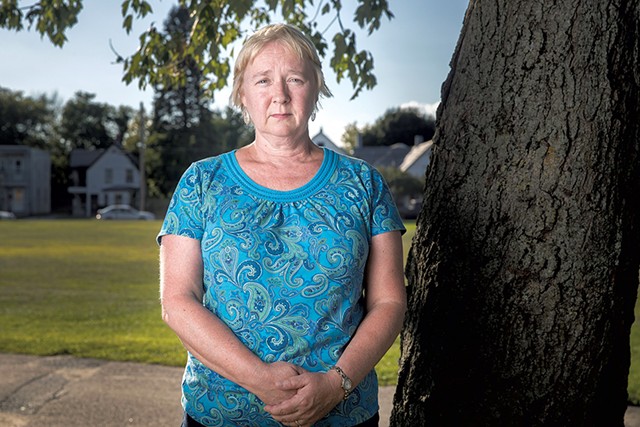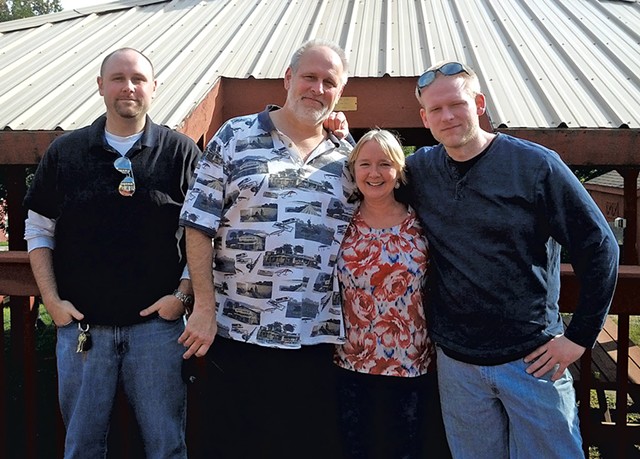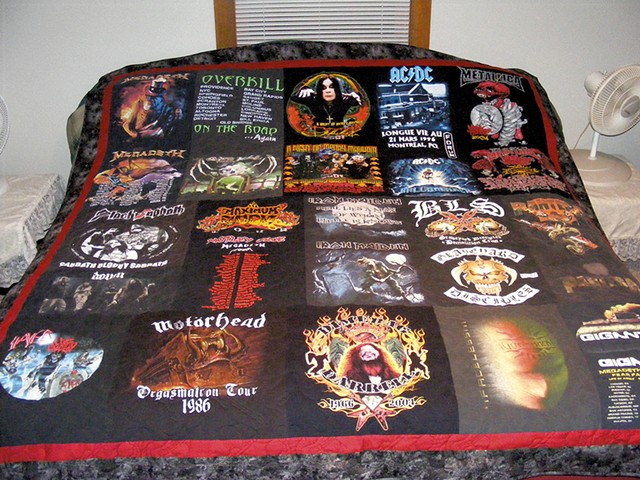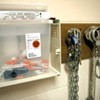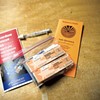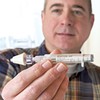Switch to the mobile version of this page.
Vermont's Independent Voice
- News
- Arts+Culture
- Home+Design
- Food
- Cannabis
- Music
- On Screen
- Events
- Jobs
- Obituaries
- Classifieds
- Personals
Browse News
Departments
Browse Arts + Culture
View All
local resources
Browse Food + Drink
View All
Browse Cannabis
View All
-
Culture

'Cannasations' Podcaster Kris Brown Aims to 'Humanize'…
-
True 802

A Burlington Cannabis Shop Plans to Host…
-
Business

Judge Tosses Burlington Cannabiz Owner's Lawsuit
-
Health + Fitness

Vermont's Cannabis Nurse Hotline Answers Health Questions…
-
Business

Waterbury Couple Buy Rare Vermont Cannabis License
Browse Music
View All
Browse On Screen
Browse Events
View All
Quick Links
Browse Classifieds
Browse Personals
-

If you're looking for "I Spys," dating or LTRs, this is your scene.
View Profiles
Special Reports
Pubs+More
Brothers' Keeper: A Mom Wants a Dealer to Pay for Her Sons' Overdose Deaths
Published August 31, 2016 at 10:00 a.m. | Updated December 12, 2019 at 1:45 p.m.
Penny Thibault got up around 6 a.m. at home in Westford on June 18, 2015, and noticed that neither the air conditioner nor the fan was running in her son Sean's bedroom. She peered inside. He wasn't there.
It wasn't unusual for Sean, 32, to crash with his brother Dennis in Burlington. They would sometimes stay up all night playing video games or horsing around. But Sean almost always remembered to call or text his mom.
She left a voicemail for him, asking, "Where are you, Sean?"
Dennis, 34, didn't pick up his phone, either. After two hours of worrying, Penny drove with her husband, Jerry, to Dennis' place on Ward Street in Burlington's Old North End. Initially, they were relieved to discover Sean's car parked out front and the porch light on. They figured their boys had probably just overslept.
But when they opened the door to the screened-in front porch, the Thibaults found both sons, slumped over within a few feet of each other. Their bodies were blue. Penny and Jerry tried to revive the two, shaking them, pounding their backs, trying to get them to breathe. A FedEx driver making deliveries nearby heard the parents' screams and called 911.
Had they been shot, or stabbed? Penny remembers thinking. But there was no blood. Maybe it was carbon monoxide poisoning? But both boys were outside.
An officer who later arrived told the Thibaults matter-of-factly: "Well, it's clearly an overdose of heroin."
"I almost slapped him in the face," Penny told Seven Days.
She never suspected that her sons took drugs. Dennis and Sean had looked healthy. They had good, full-time jobs and never missed a day of work or a family gathering. Neither had ever been arrested or hinted about a struggle with drug use.
Fourteen months later, their sudden deaths make no more sense to Penny. The only thing that seems clear to her is that the dealer who provided her sons with what turned out to be fentanyl — a synthetic opiate sometimes sold as heroin, though it is 50 times more powerful — should be held responsible for their deaths and sent to prison for a long, long time.
The Thibaults waited more than a year for authorities to charge the dealer they believe sold their sons the drug. Earlier this month, he pleaded guilty to a drug charge after reaching a plea agreement in U.S. District Court that effectively granted him immunity for any deaths he may have caused. There was no mention of Sean or Dennis.
A few hours later, Penny sent a long, anguished email to numerous Vermont media outlets, chronicling her own discoveries and frustrations. It was a detailed account of her quest for justice. "Please present my story to the public," she wrote. "Please, help me."
"I know my boys aren't innocent in all this," Penny said in an interview. "My boys bear a certain responsibility ... I don't think there's any question they've been held accountable. But they're not the only ones involved, and I don't know any justice that targets only half of those responsible."
Two Boys
Penny Beauregard and Jerry Thibault met in Burlington when she was just 11. They eventually married and settled in Richmond, where they raised three boys. Gerald, the eldest, later moved to Seattle, while Sean and Dennis stayed closer to home.
Theirs was the house where all the neighborhood kids hung out. But the Thibaults had family adventures, too. They went hunting together and attended concerts and ballgames. Jerry made enough money as a machinist to afford camping trips to Lake George, N.Y., and Hampton Beach, N.H., during which the boys competed to see who could roast the perfect marshmallow.
As teenagers, Sean and Dennis held jobs at Mexicali Grill & Cantina. They graduated from Mt. Mansfield Union High School within a year of each other and immediately started careers.
Although inseparable, the boys couldn't have been more different in their interests and temperaments.
Mellow Dennis loved watching the F-16 fighter jets based at Burlington International Airport. He talked excitedly about space travel and the possibility that humans could eventually reach Mars. A football fan, he got into computers and sought out and paid for training that landed him an IT job at Husky Injection Molding Systems, a plastics manufacturer in Milton.
He never turned down a friend's request to fix a computer or any other electronic device and usually refused anything but a nominal payment.
"Dennis was just a big teddy bear," his aunt, Catie Barnier, said. "Always there, always kind, always loving, always smiling."
Sean was grumpier, or least appeared to be that way to people who didn't know him. Family members called him the "albino rhino" for his spirited, sometimes reckless personality, and joked about the dangers of provoking him. A history dork and heavy-metal music fan, he once built a human-size shield in shop class and later bought a Civil War sword for $100.
Sean followed in his father's footsteps as a machinist. For a few years, they worked together at Whitetail Manufacturing in Williston before the younger Thibault moved on to Milton-based Rennline, which makes car parts and other equipment.
"Sean makes parts, runs the machine, programs it — Sean could do anything," Jerry Thibault said. "He had a mathematical mind. All of us Thibaults do."
Dennis left home in his early twenties and eventually found an apartment on leafy Ward Street. Sean chose to live at home, which guaranteed home-cooked meals, free laundry and steady companionship. According to his mom, he used to come home from work, wrestle with his dad and ask, "What's for dinner?"
Just two weeks before their deaths, the boys joined the extended family clan for a party in memory of their deceased grandmother. During the festivities, Dennis and Sean taught their young cousins to play poker. Relatives recalled their entertaining brotherly banter.
Nothing seemed amiss.
"They weren't opiate addicts — I didn't think," Barnier said. "But what does an opiate addict look like? A doctor, a lawyer, a husband, a wife, your best friend — your nephew?"
In this case, it might have been a roommate. Thibault family members didn't discover until after the brothers died that Burlington police had twice been called to Dennis' address for heroin overdoses, and neighbors had complained repeatedly about suspicious activity on the property. In December 2014, the cops raided the place and arrested a man living there. They later charged him with selling heroin.
Neither Dennis nor Sean was mentioned in subsequent media accounts of the bust.
Her own research since has led Penny to believe her sons were at least dabbling in drugs at that time. Their friends from Richmond told her of parties involving prescription meds. She said she has medical records that indicate Sean mentioned a possible opiate problem to his doctor as early as 2008. But there's no evidence that he ever got treatment for it.
Deadly Deals
It's been more than two years since Gov. Peter Shumlin devoted his entire State of the State address to Vermont's opiate "crisis." Since then, the problem has gotten measurably worse. The state counted a record 76 fatal overdoses last year, and that number is on pace to increase in 2016.
In response, the state has refashioned how it views drug users. The Department of Health has revamped and expanded addiction treatment options. The judiciary has tried to create court programs to help addicts instead of punishing them. Law enforcement and health officials have bought thousands of doses of the opiate-reversing drug Narcan: Last week, Shumlin announced that Vermont pharmacies would be allowed to sell the drug without a prescription.
But as the state has taken a gentler approach to drug addicts, officials have urged a tougher one in regard to drug dealers, particularly those who sell substances that are tied to overdoses.
In Bennington County, prosecutors took the unusual step of charging a drug dealer with second-degree murder after he allegedly sold heroin laced with fentanyl to a man who fatally overdosed. The February decision to file the murder charge against Trevor Shepard may be unprecedented in Vermont. It was based on evidence that Shepard had previously warned customers that the heroin could include fentanyl, Seven Days reported earlier this year.
Another, seldom-used statute is also available to prosecutors: Since 2003, Vermont has specifically outlawed dispensing an illegal drug with death resulting and given the offense a two- to 20-year prison sentence.
How many people died of all types of opioid overdoses in Vermont between 2010 and 2015?
Some overdoses fall into multiple categories, so totals in each category don't necessarily add up to the overall totals. Numbers include accidental and undetermined causes of death, but exclude suicides. Source: Vermont Department of Health
In late July, Vermont State Police used it against a Groton man, 31-year-old John Faucette III, when one of his alleged customers was found dead in Faucette's home. Faucette had been arrested in April in Massachusetts after troopers allegedly found him with a "large amount" of heroin during a traffic stop.
In December, the U.S. Attorney's Office invoked the federal version of the death-resulting law against two Brooklyn men, Gary Delima and Sharif Cargo. They were accused of selling fentanyl to a 54-year-old South Burlington man who fatally overdosed in July 2014, according to federal court documents. Delima and Cargo are also facing charges of engaging in a conspiracy to sell cocaine and heroin in Vermont and engaging in sex trafficking.
Other states are acting more aggressively than Vermont in targeting dealers connected to overdoses.
In December, the New Hampshire Attorney General's Office announced an initiative to treat most overdoses as major crimes and has pursued at least 40 investigations. The office has taught local police to treat overdose scenes as murder scenes and asked state lawmakers to free up funds for a specialized overdose prosecutor.
New Jersey launched a similar program, while lawmakers in West Virginia, Pennsylvania and New York passed laws specifically targeting dealers connected to fatal overdoses.
"The goal is that some of them will think twice about the decisions that they are making and no longer sell drugs," Assistant New Hampshire Attorney General James Vara told the Guardian. "Some, of course, won't. Some, of course, will. You hear this buzzword, 'You can't arrest your way out of the problem.' However, you have to look at these people who are dealing drugs and killing, and you have to hold them accountable."
A Matter of Intent
Not everyone in the legal community wants to lock up peddlers of product that causes overdoses.
"The problem is, you have independent, volitional action on the part of the user, and why then is the seller the responsible party for the subsequent death?" Vermont Law School professor Robert Sand asked rhetorically. "If someone sells me a souped-up motorcycle and I kill myself on it, or a handgun and I kill myself, are they responsible for it? Probably not. Someone sells me a highly dangerous substance and I use it in the manner that I intended to use it, are they responsible for my death? We seem to say 'yes' in the drug context."
In the rhetoric of hammering drug dealers, many hear echoes of failed "tough on crime" strategies that have filled U.S. prisons to overflowing with nonviolent offenders. Twenty-five percent of the world's inmates are incarcerated in America.
Would a dealer, who theoretically is already risking decades in prison for simply selling drugs, really stop if the possible penalty were higher?
"The frustration is palpable on our failure to solve this heroin epidemic, but if the last 30 to 40 years have taught us anything in terms of criminal justice, it's that harsher penalties don't deter conduct," Chittenden County State's Attorney T.J. Donovan said. "And I think the evidence is very strong on that point. I'm not sure passing a law that imposes more punitive consequences for folks who dispense or sell drugs is going to stop drug dealing."
Further complicating legal matters: Drug dealers, especially those who are based in Vermont and serve as middlemen between local customers and out-of-state networks, can defy easy stereotypes. Many are themselves desperate addicts who sell a little on the side to fund their own habits.
Also, the key witnesses may be dead, or may have used more than one dealer, making it difficult to pinpoint where the drugs came from.
"It's incredibly fact-specific," Donovan said. "It gets into the intent of the dispensing or sale of the drug. Did they know it was mixed with fentanyl? It's all about intent and knowledge."
Among the local law enforcement officials who will likely have to grapple with the issue is Washington County State's Attorney Scott Williams. Over a mid-August weekend, Barre saw nine overdoses, including one death, from a batch of heroin suspected of containing fentanyl.
The investigation into who sold the tainted drugs is ongoing.
Speaking generally, Williams said that unless there is clear evidence that a dealer knew his or her product would likely lead to an overdose, such as in the Bennington County case, he would be unlikely to seek enhanced penalties for the dealer.
"You say, 'Let's have harsher sentences for dealers,' Williams said. "We start charging somebody that buys 10 bags of heroin and then sells three bags to support their habit, and they get 30 years — that type of policing pretty clearly doesn't work. If I thought there was any significant deterrent effect, that would be different."
Dual Investigations
A couple of weeks after Dennis and Sean died, Burlington police returned their cellphones, laptops and other possessions to the Thibaults. The cops had little to say about the investigation and advised the family to remain patient.
Penny and Jerry tried something else: They went DIY. Desperate for answers, they had their eldest son, Gerald, who had flown in from Seattle after his brothers' deaths, use his computer programming skills to hack into his brothers' phones and computers in an effort to reconstruct what happened the night they died.
The family shared a partial transcript of what they say is a series of communications from Sean's cellphone.
"Where you meeting him," Dennis texted Sean at 7:31 p.m.
"Big daddies but he had to run and grab," Sean answered, referring to the pizza shop on Church Street in Burlington.
"He say how long?" Dennis asked.
Then Sean made a phone call that lasted one minute to a contact in his phone known as Bobby Robidoux, according to the Thibaults' digital records.
Sean then texted his brother. "He said only a few minutes. I called him and he said he is just up the road and should be back soon."
Sean texted Robidoux: "So I just used the bathroom across the street, so still in that same parking lot."
Robidoux texted back at 7:44 p.m. "I'll be back soon. Just be peasant (sic) it's worth the wait."
Sean sent his last communication just 13 minutes later and didn't respond to any more incoming messages. Dennis never sent another text or made another phone call.
Seven Days could not independently verify the communications or confirm that the person listed in Sean's phone contacts and who participated in the text message exchange was in fact Bobby Robidoux.
After Gerald hacked into the phones, Penny started looking into Robidoux's background. She learned from Chittenden Superior Court records that the 32-year-old former Richmond resident has a lengthy criminal record, including convictions for resisting arrest, escape, simple assault and driving under the influence.
In 2013, Robidoux was charged with possession of heroin with intent to distribute after his probation officer found him with nearly five grams of heroin, according to court documents. He was sentenced to two years in prison after pleading no contest to an amended charge of drug possession, according to court documents, and scheduled to be released in May 2015.
The Thibault family urged law enforcement to investigate Robidoux's connection to their son, repeatedly reaching out to Burlington police and the U.S. Attorney's Office. Penny had face-to-face meetings with U.S. Attorney Eric Miller and other investigators, according to correspondence provided to Seven Days.
Burlington Police Chief Brandon del Pozo declined to discuss the case in detail, beyond saying that the investigation into the Thibaults' deaths was "very thorough."
The Thibaults said they became frustrated as months passed and no one was charged with selling drugs to their sons. They hired private investigators and an attorney in hopes of uncovering more evidence.
"You should spend a great deal of time in jail for causing deaths," Penny said. "That's carelessly treating fellow human beings."
In January, federal authorities announced that Robidoux had been arrested on a charge of conspiring to sell heroin. The federal indictment alleges that Robidoux and another man, Daniel Tucker, who was arrested in New Jersey, sold heroin in Vermont and elsewhere between June and August 2015. It does not provide details of their alleged operations.
When Robidoux was arrested on January 28, the U.S. Attorney's Office emailed Penny, notifying her of the time of Robidoux's arraignment in an email titled "TODAY." He's since been incarcerated at Northwest State Correctional Facility in Swanton.
Penny says that she was excited about the news of Robidoux's arrest, and investigators urged her to hold tight in the months after he was charged.
Then, on July 25, Robidoux agreed to a plea deal with federal prosecutors. He would plead guilty to a charge of participating in a drug conspiracy, which carries a sentence of three to 20 years. The deal includes a stipulation that Robidoux cannot be held legally liable "on the basis that death or serious bodily injury resulted from the defendant's distribution of heroin."
Robidoux has never been charged, or identified in publicly available court documents, as a suspect in the Thibaults' deaths.
"I think the plea agreement speaks for itself," his attorney, Lisa Shelkrot, explained to Seven Days. "The U.S. Attorney's Office apparently doesn't share the Thibault family's beliefs. They don't have any evidence that will prove [their] allegations."
Although he declined to discuss details, Miller said in a statement: "In prosecuting our cases, we bring the most serious charges supported by the evidence. I am extraordinarily sorry for the unimaginable loss Ms. Thibault and her family have suffered. But in this case, as always, we have made charging and plea decisions that are consistent with our very careful examination of all of the available evidence."
Speaking generally, Miller also noted some of the complexities in trying to bring charges in fatal overdose cases. "Very few heroin addicts have only one source of supply. And many use other dangerous substances as well. Our office is nonetheless committed to investigating overdose death cases and prosecuting them when we believe we can prove our case to a jury beyond a reasonable doubt."
On August 18, Penny went to federal court and watched Robidoux plead guilty to the drug charge. She later emailed several Vermont news outlets, including Seven Days, to make her case that the investigation into their deaths had been mishandled.
The Thibaults suspect prosecutors cut a deal with Robidoux in hopes that he could help them convict more powerful dealers. "I think they caught a big fish and used him to catch a bigger fish, and Dennis and Sean became a casualty of that, but I don't think that's right," Penny said. "The only thing that makes sense is, he has provided a lot of important information to them. I know how that can work. Should I feel good about the general good? I don't know. I suppose I should because I can't bring my sons back. But I don't want their deaths to be in vain."
A Sign of Something?
Friends and family urged Penny to seek mental-health counseling in the weeks after her boys died. She went to two support groups. One was for parents who had lost children, and one was for people with family members who had succumbed to drug abuse.
The children's group was full of parents who had stopped celebrating holidays and, to her eyes, stopped living. She didn't fit in. But she didn't feel comfortable in the drug support group, either, as she listened to stories of parents who tried — and failed — to save an addicted son or daughter.
"I didn't know," she said of her situation, while expressing empathy for parents who did. "I didn't have a chance to help my child."
When she's not working at an accounting firm in Williston, Penny is on a crusade to learn more about drug abuse. She's become adept at navigating the federal court's online docket, and reads affidavits and warrants for Vermont drug cases. She spends hours a night reading on the subject. Recently, she became alarmed about stories of addicts in the Midwest dying from heroin spiked with carfentanil, an elephant tranquilizer that is even more potent than fentanyl. She's researched slang terms she found in her sons' phones and emails.
"She told me she was one of those people who thought of people who died from overdoses as junkies, people you don't want to look at. She never thought anyone in her family would do it," her sister-in-law, Jean Mahoney, told Seven Days. "She's told me she was ignorant of the whole situation, and she's trying to find closure any way she can."
Mostly, Penny tries to answer the questions that she knows can't be answered: "Why?" And, "Should I have known?"
She recalls Sean had a car accident in 2012. He wasn't hurt, but could that have been a sign of something? And how could she have missed the news of the raid on Dennis' apartment?
The Thibaults find some solace knowing that, in the end, their boys were together. But Penny is haunted by their final moments: Did they both die at the same time? Did one watch the other die and know he, too, was doomed?
Jerry tries to put it out of his mind. He focuses on his wife, comforting her on nighttime walks, during which she has been known to scream.
"It's been hell," he said. "I'm trying to stay off the subject so I don't get her going."
Penny is thinking about speaking at local schools or launching some kind of public awareness campaign — even though she knows many people may conclude that her sons were responsible for their own deaths.
"What's the answer? I don't have the answer," she said. "My sons deserve justice, and I can't sleep at night thinking there's one more thing I could do to bring that."
Correction, September 2, 2016: The Thibault brothers were killed by fentanyl alone, according to the Office of the Chief Medical Examiner. A previous version of this story contained an error.
The original print version of this article was headlined "Brothers' Keeper"
Related Stories
Got something to say?
Send a letter to the editor
and we'll publish your feedback in print!
Tags: Crime, Burlington, Dennis Thibault, fentanyl, heroin, interactive, opiate addiction, Opioid Crisis, overdose, Penny Thibault, Sean Thibault
More By This Author
About the Artist

James Buck
Bio:
James Buck is a multimedia journalist for Seven Days.
James Buck is a multimedia journalist for Seven Days.
Speaking of...
-

The Café HOT. in Burlington Adds Late-Night Menu
Apr 23, 2024 -

Burlington Mayor Emma Mulvaney-Stanak’s First Term Starts With Major Staffing and Spending Decisions
Apr 17, 2024 -

Totally Transfixed: A Rare Eclipse on a Bluebird Day Dazzled Crowds in Northern Vermont
Apr 10, 2024 -

Middlebury’s Haymaker Bun to Open Second Location in Burlington’s Soda Plant
Apr 9, 2024 -

Police Search for Man Who Set Fire at Sen. Bernie Sanders' Burlington Office
Apr 5, 2024 - More »
Comments (7)
Showing 1-7 of 7
Comments are closed.
From 2014-2020, Seven Days allowed readers to comment on all stories posted on our website. While we've appreciated the suggestions and insights, right now Seven Days is prioritizing our core mission — producing high-quality, responsible local journalism — over moderating online debates between readers.
To criticize, correct or praise our reporting, please send us a letter to the editor or send us a tip. We’ll check it out and report the results.
Online comments may return when we have better tech tools for managing them. Thanks for reading.
- 1. Barre to Sell Two Parking Lots for $1 to Housing Developer Housing Crisis
- 2. Vermont Awarded $62 Million in Federal Solar Incentives News
- 3. Home Is Where the Target Is: Suburban SoBu Builds a Downtown Neighborhood Real Estate
- 4. More Vermont Seniors Are Working, Due to Financial Need or Choice. They May Help Plug the Labor Gap. This Old State
- 5. Property Tax Relief Bill Sparks Partisan Feud News
- 6. Burlington Mayor Emma Mulvaney-Stanak’s First Term Starts With Major Staffing and Spending Decisions Politics
- 7. Town of Roxbury Sues Over Budget Vote That Could Close Its School Education
- 1. Totally Transfixed: A Rare Eclipse on a Bluebird Day Dazzled Crowds in Northern Vermont 2024 Solar Eclipse
- 2. Zoie Saunders, Gov. Scott’s Pick for Education Secretary, Faces Questions About Her Qualifications Education
- 3. Don't Trash Those Solar Eclipse Glasses! Groups Collect Them to Be Reused 2024 Solar Eclipse
- 4. Burlington City Council Approves Rezoning Plan to Boost Housing Supply News
- 5. State Will Build Secure Juvenile Treatment Center in Vergennes News
- 6. Rising Costs and Property Tax Hikes Again Threaten the Survival of Small Schools Education
- 7. Queen of the City: Mulvaney-Stanak Sworn In as Burlington Mayor News





























